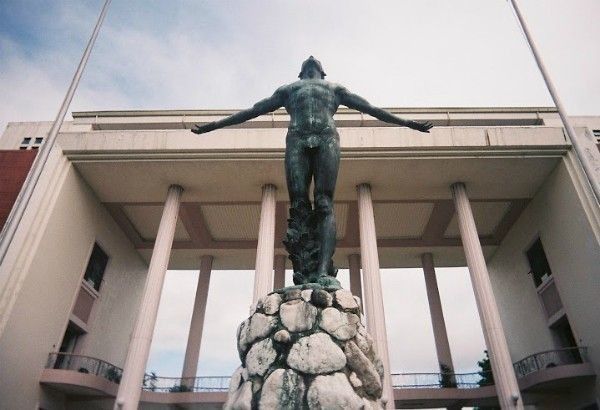Tagged again for 'recruiting communists', UP explains what it actually does

MANILA, Philippines (Updated 1:50 p.m.) — Amid continued red-tagging and false claims of recruitment of communist insurgents, the University of the Philippines has asserted that it is an education institution that has trained and produced experts and even government officials.
In a statement on Thursday, the UP Office of the Vice President for Public Affairs pointed out that recruiting communists is not its mission as an educational institution.
"The University’s core mission is knowledge and innovation creation, production, and dissemination, using various approaches of knowledge transfer," it said.
This comes on the heels of President Rodrigo Duterte's threat to defund UP in relation to Ateneo de Manila students holding a strike to hold the government accountable for its disaster response.
In a speech that aired late Tuesday night, Duterte said partly in Filipino: "I will stop the funding. You do not do anything except recruit communists there anyway."
Presidential spokesperson Harry Roque has said that he has since clarified with the president that the academic strike is by Ateneo students.
Being an activist does not mean one is a communist and the belief in communism is in itself not illegal.
UP stressed that it has “played a critical role in training the professionals, high-level specialists, scientists and researchers who are needed by the country to generate new knowledge in support of development needs and goals.”
It pointed out that it has mobilized its research in broad disciplines — from molecular biology studies to analysis of the pandemic’s socio-economic impacts — to help launch COVID-19 initiatives.
It added that many UP graduates are officials too, including 15 members of Duterte's Cabinet.
Academic freedom and militant activism
“The University of the Philippines values academic freedom—the freedom to think, to speak, to study, to teach, and even the freedom to disagree,” UP, which has a history of student activism, also said.
It explained that the university also “encourages critical thinking which, at times, may manifest as an attitude of dissidence and anti-authoritarianism.”
But UP asserted that it cannot be deemed as anti-government because its mandate as a national university is clear.
"Its community of scholars is dedicated to the nation’s quest for development. And so, UP will continue to lead as a public service university by providing service to the nation including scholarly and technical assistance to the government, the private sector, and civil society," UP added.
In a separate statement, UP Visayas said that militant activism is part of the university’s institutional history and was borne of the “atmosphere of intellectual freedom and vigorous exchange of ideas” in its campuses. It is in this atmosphere that UP produced leaders in various sectors of the society, it added.
"UP is a diverse and plural place where all kinds of ideas are welcome. Our faith is in diversity, which we view as essential to creating a progressive society," UPV said.
"How people eventually live out their political belief is beyond the control of any university. UPV does not, and will never, condone acts of lawless violence," it also said.
This is not the first time Duterte’s officials accused the university as being used as venues for organizing and mobilizing by the New Peoples’ Army, the armed wing of the Communist Party of the Philippines.
RELATED: How films and art can help protect Martial Law memory from revisionism
In October 2018, then-Brig. Gen. Antonio Parlade Jr., Armed Forces of the Philippines assistant deputy chief of staff for operations at the time, accused the Communist Party of the Philippines of inciting students to rebel against the government using film showings on martial law in 18 universities, including UP.
The AFP later admitted that some of the schools in the list were subject of continuing validation.
Parlade is now spokesperson of the National Task Force to End Local Communist Armed Conflict.
- Latest
- Trending

































